礼貌大同策略在国际商务谈判语言中的实现
礼貌原则及其在国际商务谈判中的应用

礼貌原则及其在国际商务谈判中的应用赵然;张晶【摘要】礼貌使用语言是不同语言使用者实现成功交际的重要途径之一,同时也是不同语言使用者运用的语用策略。
从语用学角度来看,礼貌原则的三个主要特征是:级别性、合适性及冲突性;而其应用方式主要是通过言语表达。
文章对礼貌原则在国际商务谈判中的案例进行了语用分析,以便更好地理解礼貌原则及其实际应用。
%Using language politely is an important way to achieve a successful communication with different language users,and it is a pragmatic strategy as well.From the perspective of pragmatics,politeness principle has three main characteristics: gradations,appropriateness,and conflicts.The application way of politeness principle is mainly verbal communication.This paper adopts politeness principle to analyze the business negotiation case,so as to get a better understanding of it in international business negotiation.【期刊名称】《齐齐哈尔大学学报(哲学社会科学版)》【年(卷),期】2012(000)003【总页数】3页(P150-152)【关键词】礼貌原则;国际商务谈判;语用分析【作者】赵然;张晶【作者单位】东北农业大学文法学院,黑龙江哈尔滨150001;东北农业大学文法学院,黑龙江哈尔滨150001【正文语种】中文【中图分类】H314礼貌是一种可以观察到的社会现象,一种为达到一定目标的手段,一种约定俗成的行为规范[1]。
国际商务谈判中礼貌语的运用策略

ECONOMICR ELATIONSAN DF RE I GNPRACTICE INTRADE613.以成交计量单位申报的,须填报与海关法定计量单位转换后的数量,同时还必须将成交单位及数量填报在本栏的第三行。
如成交单位与海关法定计量单位一致时,本栏目第三行为空。
例如2010年6月,上海某报关企业申报出口一批钢卷尺到孟加拉国,法定计量单位为“个”,该企业在第一行已正确填报,可是该批出口货物是按“罗(Gross ,1罗=144个)”对外签约并实际成交的(看商业发票),国税部门已开出的增值税发票上也是按“罗”填制的,这样,报关企业在实际成交计量单位的申报错误(如第三行漏填),会致使货主企业在办理出口退税过程中,由于出口报关单单位数据与实际单位数据不一致,国税部门提出异议而不能及时办理退税造成不必要的麻烦。
(二)“件数”、“包装种类”栏目报关单表头部分的“件数”、“包装种类”栏目是与装箱单、提单当中的相应栏目有逻辑对应关系,即:No.of Packages 。
常见的包装种类有:carton (纸箱),wooden case (木箱),pallet (托盘),barrel (木桶),bundle (捆),bale(包),nude (裸装),in bulk (散装)等。
特别需要注意的是,单据中只要列明托盘个数,原则上,报关单的“件数”和“包装种类”栏要分别填报托盘的个数和托盘。
例如:2pallets 100cartons ,即100个纸箱,共装2个托盘。
报关单的“件数”栏应填报:2;“包装种类”栏填报:托盘。
需要注意的是,“数量及单位”栏与“件数”、“包装种类”栏并没有必然的联系,在报关单填制中,一些操作人员,特别是初学者往往把两者混淆。
件数是指按包装种类计数货物的数量,对该含义的理解应该结合包装种类的含义,它不同于买卖双方成交的数量。
例如,上海某公司以每双10美元的价格出口运动鞋4800双,每双鞋装入一个纸盒中,而每12双鞋装入一个大纸箱,共计400个纸箱,然后装入集装箱发运。
试析礼貌理论在国际商务谈判中的应用

试析礼貌理论在国际商务谈判中的应用On the Application of Polite Language in International Business NegotiatioAbstract:Based on Brown and Levinson’s politeness strategy,face theory and Leech’s polite principle,this paper analyzes in detail the application of polite language such as vagueness,indirectness,mitigation,compliment in business negotiation,aiming at shedding light on further research in international business negotiation.Key W ords:International business negotiation;Politeness;Politeness strategy摘要:本文以布朗和列文森的礼貌策略、面子理论及利奇的礼貌原则为基础,结合商务谈判中的具体案例,探讨了模糊表达、委婉表达、低调陈述、恭维言辞等礼貌语用策略在商务谈判中的体现和应用,阐述了礼貌对商务谈判的影响,希望能对国际商务谈判的研究有所帮助。
关键词:国际商务谈判;礼貌;礼貌策略一、引言礼貌,作为一种社会现象,已渗透到人们生活的各个方面。
一直以来,各个研究领域的专家和学者都在不断地探索、分析其实质内容、原则与策略、功能及影响,并力图将研究所得成果运用于实践当中,从而使人们的沟通与交流能更顺畅地进行。
商务谈判是经济贸易合作的双方为达成某种交易或为了解决某种争端而进行的协商活动。
其实质即通过语言开展经济活动。
谈判双方既有合作的一面,又有冲突的一面,并都力图在与对方合作的过程中赢得最大的利益。
国际商务英语谈判中的礼貌原则和策略研究

国际商务英语谈判中的礼貌原则和策略研究在国际商务领域,英语谈判是一项常见的工作技能。
在谈判中,礼貌原则和策略是非常重要的,它们不仅能够帮助建立良好的谈判氛围,也能够帮助达成双方的共识和合作。
本文将对国际商务英语谈判中的礼貌原则和策略进行深入探讨,旨在为从事国际贸易和商务活动的人士提供一些参考和指导。
一、礼貌原则1. 尊重对方在国际商务英语谈判中,对方的尊重是非常重要的。
无论是在语言使用上还是在行为举止上,都应该对对方表示尊重。
在语言使用上,可以使用礼貌用语,如“please”、“thank you”等,体现自己的礼貌和尊重。
在行为举止上,可以尊重对方的文化习惯和信仰,避免做出冒犯对方的行为。
2. 保持礼貌在谈判中,不论是面对面的谈判还是通过邮件或电话进行的谈判,都应该保持礼貌。
即使对方提出的条件或要求不符合自己的利益,也应该以礼貌的方式表达自己的意见,并且尊重对方的观点。
3. 沟通透明在国际商务英语谈判中,沟通透明是非常重要的。
双方应该坦诚相待,把自己的意图和期望表达清楚,不做虚假承诺或隐瞒重要信息。
只有在沟通透明的基础上,双方才能建立起信任和合作关系。
二、谈判策略1. 言辞委婉在国际商务英语谈判中,言辞委婉是非常重要的谈判策略。
通过使用委婉的语言,可以避免直接拒绝或冒犯对方,从而保持谈判的和谐氛围。
在拒绝对方的要求时,可以使用“我会考虑一下”、“这个问题我们需要再商讨一下”等委婉的表达方式。
2. 理性冷静在谈判中,双方往往会因为利益的分歧而产生矛盾和冲突,这时需要保持理性冷静,不要陷入情绪化的状态。
只有在理性冷静的状态下,才能够客观的分析问题,找到解决问题的方法,并最终达成共识。
3. 适时让步在国际商务英语谈判中,适时让步是一项非常重要的策略。
在谈判中,双方往往需要共同让步,才能够达成最终的协议。
适时让步并不代表自己的软弱,而是在权衡利益和成本的基础上做出的理性选择。
通过适时让步,可以增加双方的谈判空间,创造更多的合作机会。
礼貌语言在国际商务谈判中的运用

中山大学学报论丛 , 0 年第2 卷第 1 期 20 6 6 0
SU Y S N AT EN UNI ERS TY FORUM V I
,
ห้องสมุดไป่ตู้
Vo. 6 N . 0 2 0 12 o 1 0 6
礼貌语 言在 国际商务谈判 中的运用
济效 应 ,能 为谈 判双 方取 得 “ 共赢 ” 起 到重 要 的作用 。
二、 礼貌语 言在国际商务谈 判语 境下运用 的理据
商务谈判就是 贸易双方为了实现交易 目标或解决争端而相互协商的活动。作为一种经济的 协调行为过程 ,谈判是双方观点互换 、情感互动、利益互惠的人际交往活动。其中 ,商务谈判 的一些基本原则使礼貌语言的使用成为必要 。如 :谈判中的平 等与合作原则 、互利互 惠原则 、 求同存异原则 、对事不对人原则等。谈判双方地位平等 ,他们既竞争又合作 ,且双方 的目标都 很明确 ,都力争己方利益最大化 。利益冲突和分歧是客观存在 的,但只有获取 (ae t )而没有 k 给出 (i )谈判就不可能成功 ;互利互惠是指谈判双方 “ 给有取” (i . dt e ,双方 ge v 有 g ea — k ) v n a 都获益 ;双方在力 图赢得利益最大化的同时必须考虑合作 ,以免谈判陷入僵局或破裂 。如果把 礼貌原则 中 “ 、“ 损” 益” 应用于商务谈判 中基本原则的话 ,那么 “ 给”就是损及 自身利益 , 惠及对方的利益 ;“ 取”就是惠及 自身利益 ,损及对方利益 。这里的惠与损主要指经济利益分 配多少的问题 ,但也指惠及或伤害对方面子等方面的问题。当然 ,在谈判 中,面子 与经济利益
言的形式。在命题内容损及 听话人时 ,话语越间接 ,供听话人选择 的余地 越大 ,话语就越礼 貌 ;当惠及听话人时 ,直接的话语也是有礼貌的。这样 ,在言语交际中,语言形式的选择与礼 貌就形成相互制约的关系。当然 ,利奇也认为 ,礼貌语言的运用 ,同交 际双方所处的利害关系
礼貌原则视角下的国际商务谈判语用策略研究

礼貌原则视角下的国际商务谈判语用策略研究一、内容综述随着全球化的推进和国际商务交往的日益频繁,国际商务谈判已成为企业间不可或缺的一环。
在这一过程中,语言不仅是沟通的桥梁,更是文化的载体和策略的体现。
礼貌原则作为语用学的一个重要分支,为我们理解和运用语言提供了全新的视角。
它强调在言语交际中应遵循礼貌原则,以维护双方的和谐关系和社会和谐。
在国际商务谈判中,礼貌原则的应用尤为重要。
通过遵循礼貌原则,谈判者可以在一定程度上预测对方的可能反应,从而做出更恰当的回应,提高谈判成功率。
礼貌原则还有助于营造积极的谈判氛围,促进双方的合作与交流。
尽管礼貌原则在商务谈判中的应用已日趋广泛,但学术界对其内涵和适用性的研究尚显不足。
本文旨在从礼貌原则的视角出发,探讨国际商务谈判中的语用策略。
本文将从礼貌原则的基本理论入手,深入剖析其在商务谈判中的具体应用,并结合实例进行分析,以期对国际商务谈判提供一定的理论支持和实践指导。
1. 文章背景及目的在当今全球化的商业世界中,国际商务谈判是一项至关重要的技能。
随着企业不断地扩展海外市场,跨文化沟通变得尤为重要,礼貌原则在国际商务谈判中扮演着举足轻重的角色。
本文旨在从礼貌原则的视角出发,探讨国际商务谈判中的语用策略,以期为商务人士提供实际可行的建议,帮助他们更有效地进行跨文化沟通。
文章背景及目的部分主要强调了礼貌原则在国际商务谈判中的重要性以及跨文化沟通中礼貌策略的应用价值。
具体内容包括:随着国际贸易的增加,国际商务谈判成为企业间交流的重要渠道,而礼貌原则作为人际交往中的重要原则,在商务谈判中具有不可忽视的作用。
由于文化差异,商务谈判往往伴随着误解和冲突,运用礼貌原则可以降低误解,促进双方的合作。
本文将从礼貌原则的角度出发,分析在国际商务谈判中如何运用语用策略,以提高沟通效果,实现合作共赢。
通过探讨礼貌原则在不同文化背景下的应用差异,文章旨在为国际商务谈判的人员提供具体的指导和建议。
国际商务谈判中礼貌策略的使用

国际商务谈判中礼貌策略的使用摘要:国际商务谈判中,双方是既合作又竞争的关系,在保持合作关系的前提下,各方都想获取最大利益,这就需要使用恰当的语言来实现,尤其是礼貌策略。
本文根据Brown和Levinson的面子论,尤其是积极礼貌策略、消极礼貌策略和非公开威胁面子的礼貌策略,从语用学的角度来分析礼貌策略在商务谈判中的应用。
关键词:礼貌;礼貌策略;国际商务谈判一、礼貌策略Brown和Levinson有关礼貌的理论涉及三个基本概念:面子(face)、威胁面子行为(face threatening acts)和礼貌策略(politeness strategies)。
面子分为两种:积极面子(positive face)和消极面子(negative face)。
前者指希望得到他人的认可、赞同;后者是指不希望他人干涉阻碍个人的行动自由。
在言语交际中,这两种面子都有受到伤害的可能性,因为许多言语行为在本质上是威胁面子的行为。
交谈中只有满足上述两种面子的需求才能达到交际的目的。
为保持人际关系的融洽与和谐,人们有必要采取礼貌手段来减弱威胁面子行为的侵害程度。
针对威胁面子行为.Brown和Levinson提出了礼貌策略的5个等级:”公开地、赤裸裸施行面子威胁行为”意味着听话者以最直接的方式施行面子威胁行为;积极礼貌以接近为基础”,说话者表明与听话者之间有共同之处,以满足对方积极面子需求;消极礼貌是以”回避为基础“,听话者通过承认并尊重对方的消极面子的需要,不干预听话者的行动自由来满足对方的消极面子需求;”非公开施行面子威胁行为”对面子的威胁最间接.说话者的言语行为较模糊.使听话者可能从另一个角度对之加以理解,这样,说话者对特定的意图就不会有责任;”不施行面子威胁行为指说话者不施行某一特定的面子威胁行为以避免对听话者可能的冒犯。
在决定选择哪一级礼貌策略之前.人们一般要对可能造成面子伤害程度的大小作出估计。
威胁面子行为的大小取决于三种因素:权势、社会距离和言语行为本身所固有的强加程度。
国际商务英语谈判中的礼貌原则和策略研究

国际商务英语谈判中的礼貌原则和策略研究
在国际商务英语谈判中,礼貌原则和策略是非常重要的,它们可以帮助谈判双方建立
良好的关系和有效地达成协议。
下面是礼貌原则和策略的研究。
礼貌原则是国际商务英语谈判中必须遵守的基本原则之一。
礼貌原则强调尊重对方的
文化和价值观,并避免言语和行为上的冲突。
在谈判中,双方应该保持礼貌和谦虚的态度,尊重对方的观点和意见。
礼貌策略在谈判中起着重要的作用。
一种常见的礼貌策略是使用礼貌用语和口语表达
方式。
在提出自己的要求时,可以使用委婉的措辞,如“我们认为可能会有这种可能性”
而不是直接说“我们要求这样做”。
这样可以缓解对方的防御心态,增加合作的可能性。
应该避免使用冲突性的语言和表达方式。
在表达对方错误或不合理的观点时,可以使
用措辞委婉的质疑方式,如“我不太确定这个观点是否正确”而不是直接说“你错了”。
这样可以避免引发冲突和破坏谈判氛围。
与此要注意言语和行为上的礼节。
在谈判中,双方应该保持谦逊和尊重对方的态度。
当对方提出问题或关切时,应认真倾听并给予适当的回应。
要注意自己的非语言沟通方式,如面部表情和姿势。
这些也是在谈判中表达自己礼貌与尊重的重要手段。
礼貌原则和策略在国际商务英语谈判中的作用不可忽视。
通过尊重对方的文化和价值观,使用礼貌用语和口语表达方式,避免冲突性的语言和表达方式,以及注意言行举止上
的礼节,可以增加谈判的成功率并建立良好的商务关系。
在国际商务英语谈判中的礼貌原
则和策略研究具有重要的实际意义。
国际商务英语谈判中的礼貌原则和策略研究

国际商务英语谈判中的礼貌原则和策略研究随着全球化趋势的发展,国际贸易的频繁往来,国际商务英语谈判已成为一种非常重要的交流方式。
在商务谈判过程中,礼貌是非常重要的一个因素,礼貌可以在谈判双方之间建立良好的人际关系,从而促进谈判的顺利进行。
本文将就国际商务英语谈判中的礼貌原则和策略进行探讨。
一、礼貌原则礼貌原则是指在商务谈判中应该遵循一些基本的礼仪和行为准则。
下面是一些常见的礼貌原则:1. 尊重尊重是谈判过程中最基本的原则。
在谈判过程中,双方应该尊重彼此的想法和立场,避免对方感到被忽视和不尊重。
2. 正直正直是指在谈判中必须遵循真实诚实的原则,不使用虚假信息或误导性言语。
双方之间的相互信任是谈判成功的关键。
3. 诚信诚信是指在谈判中,双方必须根据自己的承诺行事。
如果不能兑现承诺,应该及时通知对方并协商合理解决方案。
4. 公正公正是指在谈判中要遵循某些公正的规则或标准。
双方应该尊重规则,避免利用自己的优势欺负另一方。
二、礼貌策略在国际商务英语谈判中,礼貌策略是非常关键的,因为这有助于建立信任和互相尊重的良好关系,从而达成谈判的目标。
下面是一些常见的礼貌策略:1. 避免直接指责在谈判中,双方可能会对对方的决策或做法提出批评,但是提出批评的方式至关重要。
尽可能避免使用过分激烈的语言,即使对方犯了错误,也应该避免在公开场合直接指责。
2. 使用礼貌用语礼貌用语可以为您的谈判增添几分魅力。
例如,在发表意见或提出问题时,使用诸如“请问”、“谢谢”、“对不起” “请等一下”这些礼貌用语,都可以让你的言辞更加温和。
3. 尊重文化差异在国际商务英语谈判中,遇到不同文化的商人是很常见的。
对于这种情况,在谈判前可以了解对方文化的一些基本知识,以了解他们的语言、习惯、价值观和信仰,并以此避免不必要的误解和冲突。
4. 倾听对方的意见倾听对方的观点是建立信任和感情的关键。
在谈判过程中,必须认真听取对方的意见,理解其利益和需求。
尊重对方的观点可以让你获得更多的信息,以更好的达成共同的目标。
论商务谈判中的礼貌语言策略

论商务谈判中的礼貌语言策略商务谈判实质上是通过语言进行的经济活动。
其成功与否在很大程度上取决于语言的运用。
谈判双方既有合作的一面,又有冲突的一面。
谈判的任何一方正与对方合作的同时,都力图赢得最大利益。
谈判双方无疑都需要适当的语言来表达,使己方在利益冲突比较厉害的方面占优势。
因此,使用有效的谈判策略及语言是不可缺少的,其中,礼貌策略及其相关的语言起着重要作用。
从语用学的礼貌及其礼貌语言策略,我们可以探索出其在商务谈判语境下的理论意义及其现实指导意义。
首先,商务谈判原则及其语言之间的关系有必要运用礼貌语言策略。
正如谈判专家科恩·赫伯特所言,成功的谈判“并非以一方独得而赢,而以双方各有所得而赢”。
基于此,使用恰当的语言是必不可少的。
礼貌语言是符合礼貌原则而使用的语言,以体现说话人对别人的礼貌行为,如友好,尊重,不伤害别人面子等行为。
礼貌原则由合作原则衍变而来。
说话者出于礼貌的缘故,故意违反合作原则中的某些规则,产生言外之意。
礼貌原则分为得体准则,慷慨准则,赞誉准则,谦逊准则,一致准则,同情准则。
不同的语言表达方式体现出不同礼貌程度差异。
语用理论家认为人们交谈中的言语行为都是一些威胁面子的行为。
恰当地对待威胁面子行为,从而尽量地保留交际双方正、负两方面的面子,都需要恰当地运用礼貌和礼貌语言策略。
就商务谈判礼貌语言表达而言,主要表现有模糊表达,委婉暗示,低调陈述,称赞对方等。
模糊表达方式多种多样。
常适合于一些商务谈判交际的有:限于授权、避免直言、提供台阶等等。
这种方式不仅可以试探彼此的意图,而且可以减轻和缓和说话人的语气,减弱威胁对方面子行为的程度,同时给自己留有余地等等,从而增加谈判的灵活性。
委婉的语言,不仅表示客气,缓和气氛,而且能体现说话人的文化修养,从而更好地达到交际的目的;特别在表达不同意见时,可避免直接伤害对方的感情,因而这种表达易被人接受。
低调陈述是一种表达自己的优势的有效方法,避免给人一种自吹自擂,口气傲慢而夸张的印象;但这并不是“自贬”,而是为了降低对方的不信任感,甚至于反感。
礼貌策略在国际商务谈判中的运用学位论文
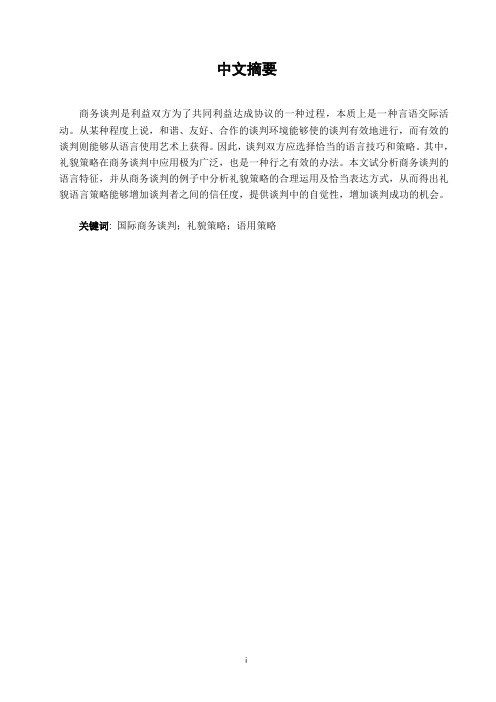
中文摘要商务谈判是利益双方为了共同利益达成协议的一种过程,本质上是一种言语交际活动。
从某种程度上说,和谐、友好、合作的谈判环境能够使的谈判有效地进行,而有效的谈判则能够从语言使用艺术上获得。
因此,谈判双方应选择恰当的语言技巧和策略。
其中,礼貌策略在商务谈判中应用极为广泛,也是一种行之有效的办法。
本文试分析商务谈判的语言特征,并从商务谈判的例子中分析礼貌策略的合理运用及恰当表达方式,从而得出礼貌语言策略能够增加谈判者之间的信任度,提供谈判中的自觉性,增加谈判成功的机会。
关键词: 国际商务谈判;礼貌策略;语用策略ContentsAbstract (i)摘要................................................................................................................................................. i i1. Introduction and Literature Review (1)1.1 Introduction (1)1.2 Literature review (1)2. Language Features of Business Negotiation and the Definition of Politeness (3)2.1 Language features of business negotiation (3)2.1.1 Idiomatic and professional terms (3)2.1.2 Abundant uses of polite languages (3)2.1.3 Vague languages (4)2.2 The definition of politeness (4)3. Politeness Principle as a Strategy in International Business Negotiation (6)3.1 Politeness principle (PP) and relevant theories (6)3.1.1 Leech’s politeness principle (6)3.1.2 Six maxims of politeness principle (6)3.2 Politeness strategies (7)3.2.1 Positive politeness strategy (7)3.2.2 Negative politeness strategy (7)3.3 The functions of politeness strategy in international business negotiation (8)3.3.1 The benefit of face maintenance (8)3.3.2 The benefit of cooperative relations (8)3.3.3 The benefit of establishment of harmonious negotiation atmosphere (8)3.3.4 The benefit of strategy adaptations (9)3.3.5 The benefit of o ne’s own interests maintenance (9)4. Application of Politeness Strategy in International Business Negotiation (10)4. 1 Application of tact maxim (10)4.2 Application of generosity maxim (12)4.3 Application of humorous expressions (13)4.4 Application of euphemistic expressions (14)4.5 Application of persuasive expressions (15)5. Conclusion (17)Note (18)Bibliography (19)Acknowledgements (20)1.Introduction and Literature Review1.1IntroductionWith the development of globalization, trades with other countries become more and more frequent than ever before. A win-win situation is the most desired one that both parties with common and conflicting interests pursue. In business, it is mostly through negotiations that both parties bridge the difference and reach a fair and mutually satisfactory deal.Business negotiation plays a fundamental role in a transaction because negotiators need to negotiate with each other before signing a contract. If a negotiator is only familiar with the knowledge in trade, then he/she might not be able to deal with transaction successfully. But if he/she knows and utilizes some pragmatic strategies, the business activities will proceed smoothly and lead to what is desired and expected.Politeness, a social phenomenon, touches upon every aspect of life. According to politeness theory, politeness serves to both reflect and regulate social distance (Brown & Levison, 1987).Since business negotiation is not only a complex human activity but also a process in which at least two or more parties with common and conflicting interests try to reach an agreement of mutual benefits, it is of great value to use polite strategy in business negotiation, which not only establishes and maintains but improves the social relationship with each other. Only in this way can both parties establish and maintain a harmonious, friendly and cooperative atmosphere with some appropriate, efficient and effective strategies. Among them, politeness strategy is the most commonly used one that contributes to a successful business negotiation.Not only does the thesis focus on the language features of business negotiation, the theory of politeness principle and its maxims and the politeness strategy, but also emphasize how to use politeness strategy in international business negotiation, especially with the use of abundant examples.1.2Literature ReviewBusiness negotiation is a kind of economic activity which is essentially through the carrier of language driven by interests. As the starting point of economic activities, negotiation plays a significant role in successful transactions. However, people in real communication often do not keep them, even intentionally violate the cooperative principle (Grice, 1975). In order to solve this phenomenon, a great amount of scholars had spent a great deal of time in studying it at home and abroad. Below are some famous scholars who make great contribution to the success of business negotiation from the pragmatic angles.The English scholar, Leech advances the use of language about courtesy problem. As to the pragmatic study about politeness, Leech (1983) puts forward another pragmaticprinciple--the Politeness Principle (PP) from angles of rhetoric and style on the basis of Grice’s cooperation principle. He holds the idea that it’s very common that the misuse of language or rudeness or misunderstanding caused by ignorance of others exists in communication, whereas, politeness through language does is the most commonly used method and the most important pragmatic principle in successful communication.He Ziran (1988), the domestic scholar, also holds that polite language is actually a pragmatic strategy. Xu Chenghuan (1902) thinks that polite language is the leverage that language communication may involve parties, which plays the role in adjusting personal relationships. This is similar to the idea of Lakoff that the polite language among people is a method of reducing friction when communicating. Whereas, professor Ran Yongping (2007) regards that politeness is an expectation associated with the most optimal relevance effect, and it is the result of understanding from a cognitive-pragmatic perspective of politeness and language choice. What’s more, he holds that language, in the form of itself, does not exist in polite problems. Politeness principle is that in the same other conditions, minimizing the expression of impolite beliefs (He Zhaoxiong, 2000:164-165).2. Language Features of Business Negotiation and the Definition of Politeness2.1 Language Features of Business Negotiation2.1.1 Idiomatic and Professional TermsThere is a series of idiomatic and professional terms in business negotiation. Generally speaking, different terms or expressions are used in different situations. For instance, in sales purchases negotiation, it includes price, quality, packing, shipping, insurance, etc. In engineering construction negotiations, it has costs, time limit, commencement, completion and the right to use, etc. All these idiomatic and professional terms have the characteristic of simplicity and pertinence. And the following examples are from Business Correspondence(A Wainwright, 2001).(1) Our usual term of payment is by D/P at 30 day’s sight.(2) Taking into consideration the transport conditions at your end, we have especially reinforced our packing in order to minimize the extent of any possible damage to the goods.(3) If the transaction is concluded on the CIF or CFR Singapore basis, the buyer must have the right to appoint the forwarding company.(4) We regret to say we are unable to accept your order at the previous prices because of a recent rise in the cost of materials.(5) The goods, before being loaded at the port of shipment, must be inspected by an inspection institution agreeable to the buyer in the presence of the buyer’s representative.(6) We should like to know if you can undertake insurance of these goods A.A.R.To sum up, idiomatic and professionalized terms are not only the basic features of business negotiation, but also the necessary parts in the business negotiation as well as in the contract.2.1.2 Abundant Uses of Polite LanguagesPolite languages create a harmonious negotiation atmosphere for both parties in order to make solid foundation for long term business relationships. In foreign trade communication, no matter agreements or disagreements of one’s ideas, it is of great significance to use polite language to show appreciation. The reason is that the success of every transaction depends on the cooperative relations of each other. And the following examples are from English- Foreign Trade Talk in English (Qin Chuan, 2004).(7) -It’s very kind of you to come and see me off at the airport, Ms. Wenhui.-My pleasure, Mr. Wilson.(8) This way please.(9) Thanks for helping me.(10)Thank you once again for everything you’ve done.To sum up, “please, thank you, kindly, appreciate, it’s very kind of you, my pleasure,” etc. are the frequently used expressions in all sections during the course of business negotiation.2.1.3 Vague LanguagesFor the sake of avoiding inconvenience and misunderstanding, language in business negotiation, whether in the oral form or written form of conversation, should be clear and precise. However, in real practice, it’s very easy fo r negotiators to misuse words. Misusing language will lead to an embarrassing situation where both parties disagree with each other while it’s not convenient for them to discuss it directly. Furthermore, sometimes negotiators cannot express their ideas clearly, or they would not like to say it clearly for some pragmatic purposes, in which cases they prefer to put vague languages to rational use.Using vague languages will make the massage sent out obscure in order to avoid what have been said being too fixed so that it can ease up the awkward situation. Vague languages have often been treated as a politeness strategy playing an active role in business negotiation. From pragmatics, vague languages have the function of maintaining the “face”(Brown&Levinson, 1987). It can not only assuage the negotiating atmosphere, but also can sound out his opponent's intentions. The examples below are from English for Business Negotiation (2nd Edition) (Ding Hengqi, Zhang Jing, 2009).(11) We could only tell you that we will try our best to advance the time of delivery.(12) We have always insisted on the principle of “equality and mutual benefit and exchange of needed goods”, but we have adopted much more flexible method in our dealing method in our dealings nowadays.(13) We would like to discuss the possibility of establishing an agency with you.(14) Your presentation make so me feel a little too… you know what I mean.In the above sentences, such phrases as “try our best to advance the time of delivery, much more flexible method, possibility, you know what I mean,” are all general expressions, which convey blurry information to the listeners. All these vague languages can make words become much more euphemistic and implicit, showing consideration for the other party and taking care to preserve the maintenance of both “face s” so that negotiations will go smoothly. Furthermore, the use of vague languages can also bring up specific atmosphere helping to triumph the other side from psychology.In conclusion, it is very important to maintain a harmonious atmosphere and avoid making tense situation in the course of business negotiation. However, conflicts are inevitable. When a face-to-face conflict occurs, in order to save each other’s faces, negotiators need to use vague expressions, otherwise, negotiation may stalemate.2.2 The Definition of PolitenessPoliteness, an important code of human social activity, is the sign of human civilization, andis a social phenomenon which touches upon every aspect of life. According to the Dictionary of Language Teaching and Applied Linguistics, politeness is defined as “the combination of interpersonal consideration and linguistic choices affecting the form and function of linguistic interaction” (Richard et al, 2000: 352).Politeness denotes that ease and gracefulness of manners which first sprung up in cities, connected with a desire to please others by anticipating their wants and wishes, and studiously avoiding whatever might give them pain.At the basic level, politeness is one of the major social constraints on human interactions regulating participants’ communicative behavior s by constantly reminding them of taking into consideration the feelings of the others. This is just like the idea of Hudson (1985: 115) –we usually try to avoid exposing others’ weakness, or raising heated controversy, unless we are sure that it will not affect the attitude of others towards us or we are indifferent to their opinions.3.Politeness Principle as a Strategy in International Business Negotiation 3.1Politeness Principle (PP) and Relevant Theories3.1.1 L eech’s Politeness PrincipleLeech regards politeness as a crucial one in explaining “why people are often so indirect in conveying what they mean.” He thus puts forward the Politeness Principle, PP (1983) so as to “rescue the Cooperative Principle (CP)①” in the sense that politeness can satisfactor ily explain exceptions to and apparent derivation from the CP. Politeness Principle is justified in language production and interpretation. Without it, CP is not fully explanatory. CP is needed to account for the indirect relation tween what people say and what they mean. But it, in itself, can not explain why people are so often indirect in the way they talk. Therefore, PP is not just an addition to Grice’s CP, but a necessary complement needed for cases in wh ich CP fails to offer a reasonable and acceptable explanation. Furthermore, PP helps to maintain effective use of language. To a large extent, PP guides man’s linguistic behavior.3.1.2 Six Maxims of Politeness PrinciplePoliteness Principle can be divided into two aspects, that is, to minimize (all things being equal) the expression of impolite beliefs, and to maximize (all things being equal) the expression of polite beliefs.Leech’s (1983:132) maxims of PP tend to go in pairs as follow:(i)Tact Maxim(a) Minimize cost to other;(b) Maximize benefit to other.(ii) Generosity Maxim(a) Minimize benefits to self;(b) Maximize cost to self.(iii) Approbation Maxim(a) Minimize dispraise of other;(b) Maximize praise of other.(iv) Modesty Maxim(a) Minimize praise of self;(b) Maximize dispraise of self.(v) Agreement Maxim(a) Minimize disagreement between self and other;(b) Maximize agreement between self and other.(vi) Sympathy Maxim(a) Minimize antipathy between self and other;(b) Maximize sympathy between self and other.It can be obviously seen that “Minimize” and “Maximize” are two key concepts in Leech’s maxims. These six “minimize”s can be summarized as decreasing favor of others, unfavor to others, and conflicts between self and others as much as possible. On the contrary, six “maximize”s can be summarized as increasing favor to others, unfavor to self, and harmony between self and others as much as possible.3.2Politeness StrategiesPoliteness strategies are used to formulate mess ages in order to save the hearer’s face when face-threatening acts are inevitable or desired. Brown and Levinson (1987) suggest some politeness strategies to save face, such as positive politeness strategy and negative politeness strategy.3.2.1 Positive Politeness StrategyPositive politeness strategies orient to preserving the positive face of other people which seek to minimize the threat to the hearer’s positive face. They are used to make the hearer s feel good about their interests and possessions as well as themselves. What’s more, they are most usually used in situations where the audience knows each other fairly well. In addition to hedge and attempt to avoid conflicts, some strategies of positive politeness include statements of friendship, solidarity, compliments, and the following examples are from Brown and Levinson (1987).(i) Attend to hearer’s interests, needs, wantsYou look sad. Can I do anything?(ii) Use solidarity in-group identity markersHeh, mate, can you lend me a dollar?(iii) Offer or promiseIf you wash the dishes, I’ll vacuum the floor.3.2.2 Negative Politeness StrategyNegative politeness strategies orient to preserving the negative face of other people and emphasizing avoidance of imposition on the hearer. This is more likely if there is a social distance between the speaker and the hearer. These strategies presume that the speaker will be imposed on the listener and there is a higher potential for awkwardness or embarrassment than positive politeness strategies. Here are some examples from Brown and Levinson (1987).(i) Be indirectWould you know where Oxford Street is?(ii) Use hedges or questionsPerhaps, he might have taken it, maybe.Could you please pass the rice?(iii) Minimize the impositionIt’s not too much out of your way, just a couple of blocks.Negative Politeness also involves more frequent use of the expressions like please, possibly might, I’m sorry but …etc. E.g.I’m sorry, it’s a lot to ask, but can you lend me a thousand dollars?3.3 The Functions of Politeness Strategy in International Business Negotiation3.3.1 The Benefit of Face MaintenanceIn many language communities, people will use polite language for the sake of others and self’s face maintenance. The reason why people do so is that they want to maintain the harmonious social relations so that communication can smoothly go on to reach the purpose of successful communication. As for business negotiation, face maintenance is one benefit of polite language. Most of the time, negotiators can not enable to make acknowledgement and feeling into compliance. Some words are correct but they are difficult to be accepted. At that moment, negotiators will adopt appropriate politeness strategies in order to save face so that it can enable the other party to accept one’s ideas pleasantly.3.3.2 The Benefit of Cooperative RelationsIt is common psychological need that people expect to have the recipient's approval during human communication process. Under interests’ circumstance, the speaker might express strong feelings followed by undermining bilateral trade cooperation. At this moment, it requires people to avoid contradictions caused by disagreement. Under such circumstance, polite language can help negotiators avoid contradictions when conflicts appear.3.3.3 The Benefit of Establishment of Harmonious Negotiation AtmosphereInternational trade negotiation is a kind of cooperative communication, which should take place in a friendly harmonious atmosphere for the sake of successful transaction. In business negotiation, for the purpose of avoiding direct positive conflicts, negotiators usually resort to politeness strategies to resolve disputes and maintain peace. Politeness strategies not only include how to use language properly, different communication languages used in different occasions, but also include the application of tact maxim, generosity maxim, approbation maxim, modesty maxim, sympathy maxim, agreement maxim, etc, which is good for establishing harmonious negotiation atmosphere.3.3.4 The Benefit of Strategy AdaptationsAs for the ways of expressions and functions, language communications are changeable which are true for verbal strategy. There will be various strategies due to various situations. Vague expression, for example, is a “negative polite” strategy, but in business negotiations it can also be a kind of negotiating tactics facilitating the negotiation smoothly and successfully. When asked to answer questions which cannot be accurately answered, an effective strategy is to use vague expression. Vague expression can reduce the other party’s face threats, and can also offer the leeway.3.3.5 The Benefit of 0ne’s 0wn Interests MaintenanceIn business negotiations, polite language can be used as negotiation skills and tactics to indicate one’s position, to get rid of unnecessary responsibility and to maintain their own interests. There are many unfair phenomena in commercial activities. Some of the big companies trusted in its own advantages often ask other small companies for some unreasonable additional requirements. If these small companies refuse to accept it which might offend large companies, it will lead to the failure of negotiation. A qualified negotiator should be the one who can get rid of unnecessary responsibility wisely. And one of the feasible methods is to tell the big companies that additional requirements can be met only if certain objective conditions can be provided.In conclusion, due to the significant functions of politeness principle as a strategy in business negotiation, it is full of value and necessity to use it appropriately. The following will be focused on how to use politeness principle as a strategy in business negotiation suitably.4. Application of Politeness Strategy in Business Negotiation4. 1 Application of Tact MaximIn music the ‘tone’of an instrument is, speaking non-technically, the way that the instrument sounds. We all know how a piano sounds; pianos all sound much alike but at the same time sound different from one another and we can distinguish a piano that sounds pleasant from one that sounds unpleasant. Similarly, negotiations have a tone. One tone sounds warm, friendly and tact can make the negotiation develop smoothly. From the below picture (A. Wainwright, 2001: 75), we can know that today all parties use language that seems to put them on the same level.According to Leech’s Politeness P rinciple, tact maxim refers to minimize other’s cost and maximize other’s benefits. In business negotiation, the complexity and hardness of negotiation determine that such tactful and flexible language is needed in order to make the negotiation be smooth and successful. Therefore, it is of great necessity and significance to take social factors into consideration when language needs to be used tactfully.A.WAINWRIGHT (2001: 78 ) found the following:It is when the question of tactfulness arises that we see most clearly that there is an intimate connation between thought and language – that we cannot alter the thought without altering the language and that we cannot alter the language without altering the thought.It is also when the question of tactfulness arises that the personal element in business negotiation becomes most crucial. It is universal known that the same language used in one situation may be suitable, while in another it may not be so.For example, a straightforward business letter addressed to a German businessman is likely to be successful, but it may be a failure if it addresses to a Japanese businessmen because it is inappropriate to use forthright tone to the Japanese. One more example, an American business manager had to explain the cause of raising the price to three clients from different countries simultaneously via email. To the Germany client, he presented the main points straightforward, while to the Lebanon one, he started with a detail explanation. However, to the one from Peru, he used a whole page to make a greeting, before coming to the central point. This example shows that it is necessary for the negotiators to consider the cultural and social background before negotiation.Below are two sentences that can also help to understand tactfulness from Business Correspondence (A. WAINWRIGHT, 2001).(15) The weight of the machine is not, as you thought, 500 KG.(16) You were mistaken in thinking that the weight of the machine was 500 KG.Obviously, the second statement suggests more strongly that the address was at fault.Furthermore, the following ways need to be avoided when negotiating(i) The tone of over - humbleness. E. g.(17) We are extremely and sincerely sorry for the error and ask that you accept our humble and sincere apology for the undue inconvenience suffered by you.It seems more acceptable to put it in this way: We are concerned about the inconvenience you have suffered, and apologize sincerely.(18) I am pleased to tell you that….If it were to be changed into You will be pleased to know that…(ii) The tone of degrading others. E. g.(19) All wise office managers around the country order Gold Fish – the most efficient of all office typewriters.No one will be persuaded by such kind of way since he has already been hurt. However, if being put into such a way: Gold Fish is popular among the office managers due to its favorable qualities, why not have a try. Then this utterance would be much more acceptable.(iii) The criticism tone. E. g.(20)Your letter is not clear at all; I can’t understand it.It will be much more polite to revise it as If I understand your letter correc tly…(iv) The forceful tone. E. g.(21) You would of course rather continue to do business with us because…The kind of utterance above is unacceptable. If it is changed to hoping that you will continue to do business with us⋯then it will be much more acceptable.(22) You must not blame us if you failed to check the goods immediately on arrival at your factory.Of course, this kind of utterance is also unacceptable. It is of course commercial practice for the customer to check goods immediately on arrival would be much more acceptable.Also such as the following sentences:(23) Would you like to have another discussion for this project?(24) You must have another discussion for this project.Example (23) makes the other party have broader choosing scope, so it becomes estranged and indifferent. It seems to have an attitude that “Accepting or not is nonsense of him”. Thus the example (23) is understood but of impoliteness. While sentence (24) is straightforward and can’t be refused, i t shows the speaker’s en thusiasm of nearly force. So it is considered as the manifestation of hospitality (He Ziran, 1995:113).“Using language tactfully means to use it politely”(He Ziran, 1998). Negotiators should adopt suitable languages according to circumstances neither being offensive nor over-polite and make sure the negotiation to continue in a harmonious atmosphere.4.2 Application of Generosity MaximGenerosity Maxim refers to minimize self - benefits and to maximize self- cost according to Leech. When applied in business negotiation, it indicates that negotiators should adopt “other attitude”rather than “self attitude”. It is very necessary to take the other party’s wishes, difficulties, backgrounds, feelings and reactions into consideration during negotiation. After that, matters can be dealt from the perspective of counter-party in order to increase the other party’s benefit as much as possible.(25) Look at this dialogue from English-Foreign Trade Talk in English (Qin Chuan, 2004:20).Mr. Qi: Mr. Kain, in honor of your second visit, I’d like to invite you to have“shuan yangro u” at Dong Lai Shun Restaurant tomorrow evening. You know it is instant boiled mutton.Mr. Kain: Thank you. “Shuan yangrou” of Dong Lai Shun is world renowned but I will have headache at the thought of eating mutton.Mr. Qi: What’s the matter?Mr. Kain: The prospects of importing mutton from China are not so good, as we are short foreign exchange this year.Mr. Qi: Egypt is a big market for the export of our beef and mutton. It would also be a great loss for us if you import nothing. We will have to work out a solution.Mr. Kain: Yes. I’m here to solve the problem. Shall we be able to do a barter trade?Mr. Qi: Yes, certainly. But what commodity do you have to exchange for our beef and mutton? Mr. Kain: What about cotton? China imports huge quantities of button form Egypt every year. It is possible for us to sell cotton as payment for your beef and mutton?In this dialogue, both parties consider their mutual benefits and start a successful negotiation. “Other attitude”in negotiations may be more helpful than “self attitude”. More examples are provided here.。
礼貌原则在国际商务谈判言语行为中的应用-商务管理论文-管理学论文

礼貌原则在国际商务谈判言语行为中的应用-商务管理论文-管理学论文——文章均为WORD文档,下载后可直接编辑使用亦可打印——1 前言国际商务谈判是一种言语交际活动,交际活动则必须通过语言媒介来完成。
在国际商务谈判中,谈判者如何恰当地使用自身的言语行为来达到谈判目的,这是谈判者经常探讨的问题。
在谈判过程中,谈判人员如能合理地运用语用策略就能增加谈判者之间的信任度,提高谈判中的自觉性,增加谈判成功的几率。
反之,在国际商务谈判中违背了这些语用策略,就有可能贻误商机,影响正常的贸易往来甚至长期的合作关系。
礼貌原则的使用可以在一定程度上减少谈判双方之间的误解,达成双赢的局面[1].因此,国际商务谈判中的语用策略研究对提高商务谈判成功的机率具有重要的现实意义。
有关国际商务谈判方面的研究,国内外已有许多学者从心理学、社会语言学或跨文化交际等不同角度对其进行过有益的探讨,有的侧重于国际商务谈判的语言信息和技巧,有的侧重于文本结构或跨文化问题等。
本文试图以礼貌原则的视角来探讨国际商务谈判言语行为中的语言特色及其礼貌言语行为策略,并尝试从语用学角度对国际商务谈判中的语用机制做出解释。
2 国际商务谈判言语行为特征2.1 谈判言语行为中的程式化表达在国际商务谈判这种特殊的语境中,谈判者所用的言语行为中部分话语经常是约定俗成的,其中的一个突出的特色就表现在谈判的语句具有程式化的特点。
在国际商务谈判中,来自不同国家或地区的谈判双方或多方由于自身的文化背景和风俗习惯,在表达同一概念时可能会在言语行为中出现一些带有地方色彩的表达方式,这就有可能影响到对方的理解甚至出现一些不必要的误会。
为了使谈判双方或多方在愉悦和谐的气氛中交流,保证在不同的文化背景下能够顺利达成一致的商务协议,国际商务谈判人员一般都要使用国际上普遍接受的言语行为方式。
由于社交过程具有仪式化特点,在商务谈判中使用商业语境中的程式化言语行为可以帮助谈判者有效地沟通谈判,避免不必要的文化冲突[2].比如商务谈判开场中常使用的正式的欢迎辞,一般商场中的介绍性套句等常常可以缓和气氛,通过这些程式化的言语行为迅速削除谈判双方的疑忌心理,为谈判的成功创造出和谐、融洽的谈判环境。
国际商务英语谈判中的礼貌原则和策略研究
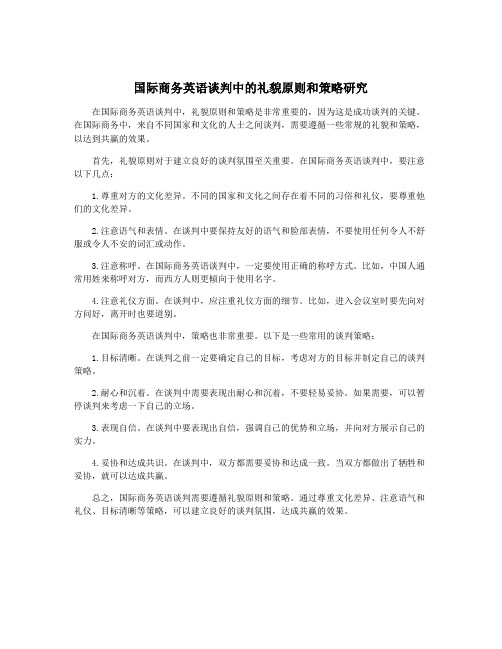
国际商务英语谈判中的礼貌原则和策略研究在国际商务英语谈判中,礼貌原则和策略是非常重要的,因为这是成功谈判的关键。
在国际商务中,来自不同国家和文化的人士之间谈判,需要遵循一些常规的礼貌和策略,以达到共赢的效果。
首先,礼貌原则对于建立良好的谈判氛围至关重要。
在国际商务英语谈判中,要注意以下几点:1.尊重对方的文化差异。
不同的国家和文化之间存在着不同的习俗和礼仪,要尊重他们的文化差异。
2.注意语气和表情。
在谈判中要保持友好的语气和脸部表情,不要使用任何令人不舒服或令人不安的词汇或动作。
3.注意称呼。
在国际商务英语谈判中,一定要使用正确的称呼方式。
比如,中国人通常用姓来称呼对方,而西方人则更倾向于使用名字。
4.注意礼仪方面。
在谈判中,应注重礼仪方面的细节。
比如,进入会议室时要先向对方问好,离开时也要道别。
在国际商务英语谈判中,策略也非常重要。
以下是一些常用的谈判策略:1.目标清晰。
在谈判之前一定要确定自己的目标,考虑对方的目标并制定自己的谈判策略。
2.耐心和沉着。
在谈判中需要表现出耐心和沉着,不要轻易妥协。
如果需要,可以暂停谈判来考虑一下自己的立场。
3.表现自信。
在谈判中要表现出自信,强调自己的优势和立场,并向对方展示自己的实力。
4.妥协和达成共识。
在谈判中,双方都需要妥协和达成一致。
当双方都做出了牺牲和妥协,就可以达成共赢。
总之,国际商务英语谈判需要遵循礼貌原则和策略。
通过尊重文化差异、注意语气和礼仪、目标清晰等策略,可以建立良好的谈判氛围,达成共赢的效果。
礼貌原则在国际商务谈判中的应用

The Application of Politeness Principle in InternationalBusiness Negotiation礼貌原则在国际商务谈判中的应用ContentsAbstract .......................................................................................................................... i i 摘要.............................................................................................................................. i i Chapter 1 Introduction (1)1.1 Background of the Thesis (1)1.2 Significance of the Thesis (1)1.3 Structure of the Thesis (1)Chapter Two Politeness Principle and Relevant Theories (2)2.1 Politeness Principle and its Maxims (2)2.2 Face Theory (3)2.3 Politeness Strategies (3)2.4 Cooperative Principle (4)Chapter Three Introduction of Business Negotiation (5)3.1 Language Features of Buisiness Negotiation (5)3.1.1 Idiomatic and Professionalized Terms (5)3.1.2 Argumentative and Persuasive Expressions (6)3.1. 3 V ague Language (7)Chapter Four The Application of Politeness Principle in International Business Negotiation (7)4.1 The Application of Tact Maxim (7)4.2 The Application of Generosity Maxim (9)4.3 The Application of Euphemism (10)4.4 The Application of Other Language Strategies (11)4.4.1 V aguness (11)4.4.2 Compliment (11)4.4.3 Understatement (11)4.4.4 Gratefulness (12)Chapter Five The Role of Politeness Principle in International Business Negotiation 12 Chapter Six Conclusion (13)References (14)AbstractBusiness negotiation is a kind of economic activity in which the parties try to reach an agreement and seek for the solutions to some problems through language. Therefore, the use of language largely determines the success of the business negotiation. Among them, Politeness Principle as an effective method is widely used in business negotiation. The application of Politeness Principle in business negotiation can enhance the mutual trust and increase the odds for negotiation success.This thesis deals with how to appropriately apply politeness strategies, such as vagueness euphemism, understatement and so forth, into business negotiation by analyzing the language features of business negotiation and politeness principle.Key words: business negotiation, Politeness Principle, application摘要商务谈判是一种为了达成协议或者寻找问题的解决办法,谈判人员通过语言进行的经济活动。
礼貌语言在国际商务谈判中的作用
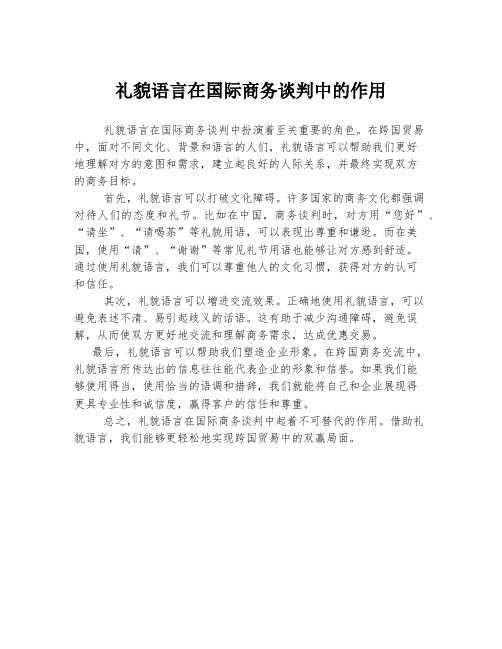
礼貌语言在国际商务谈判中的作用
礼貌语言在国际商务谈判中扮演着至关重要的角色。
在跨国贸易中,面对不同文化、背景和语言的人们,礼貌语言可以帮助我们更好
地理解对方的意图和需求,建立起良好的人际关系,并最终实现双方
的商务目标。
首先,礼貌语言可以打破文化障碍。
许多国家的商务文化都强调
对待人们的态度和礼节。
比如在中国,商务谈判时,对方用“您好”、“请坐”、“请喝茶”等礼貌用语,可以表现出尊重和谦逊。
而在美国,使用“请”、“谢谢”等常见礼节用语也能够让对方感到舒适。
通过使用礼貌语言,我们可以尊重他人的文化习惯,获得对方的认可
和信任。
其次,礼貌语言可以增进交流效果。
正确地使用礼貌语言,可以
避免表述不清、易引起歧义的话语。
这有助于减少沟通障碍,避免误解,从而使双方更好地交流和理解商务需求,达成优惠交易。
最后,礼貌语言可以帮助我们塑造企业形象。
在跨国商务交流中,礼貌语言所传达出的信息往往能代表企业的形象和信誉。
如果我们能
够使用得当,使用恰当的语调和措辞,我们就能将自己和企业展现得
更具专业性和诚信度,赢得客户的信任和尊重。
总之,礼貌语言在国际商务谈判中起着不可替代的作用。
借助礼
貌语言,我们能够更轻松地实现跨国贸易中的双赢局面。
以“礼”服人礼貌原则与国际商务谈判

在话题的引入上,他们谈到了彼此的家庭、兴趣爱好等,以拉近双方的距离。 在意见表达上,他们用词得体、态度诚恳,既表达了自己的立场,也充分尊重 了对方的观点。最终,经过愉快的交流与协商,双方顺利达成了合作协议。
3、意见表达
在表达自己的意见和观点时,谈判者应注意措辞,既要清晰表达自己的立场, 也要尊重对方的观点。例如,可以用“我觉得我们的方案更符合贵方的需求” 来表达自己的立场,同时用“您有什么建议或意见吗”来邀请对方发表观点。
礼貌大同策略的应用案例
以下是一个成功运用礼貌大同策略的国际商务谈判案例:
2、避免不礼貌的言行
在国际商务谈判中,一些不礼貌的言行可能会导致谈判的僵局或者破裂。例如, 指责、攻击、侮辱对方的言论或行为都是不礼貌的。谈判者应当尽量避免这些 言行,而是采用礼貌、尊重的方式来与对方进行沟通和交涉。
三、实例分析:以“礼”服人的 谈判策略
下面我们通过一个成功的国际商务谈判案例来说明如何以“礼”服人。这个案 例是一个跨国公司的代表团前往一个新兴市场国家进行投资考察。在谈判中, 他们遇到了一个难题:当地政府的官员不愿意在税收政策上做出让步。面对这 个问题,代表团的负责人运用礼貌原则,采取了以下几个策略:
礼貌大同策略的实现方式
1、语言选择
在国际商务谈判中,礼貌大同策略的首要体现在语言的选择上。谈判者应尽量 使用友好、委婉、真诚的语言,避免使用过于直接、生硬、冒犯的语言。例如, 可以用“我建议您再考虑一下”代替“你必须接受我的条件”。
2、话题引入
礼貌语言在国际商务谈判中的作用
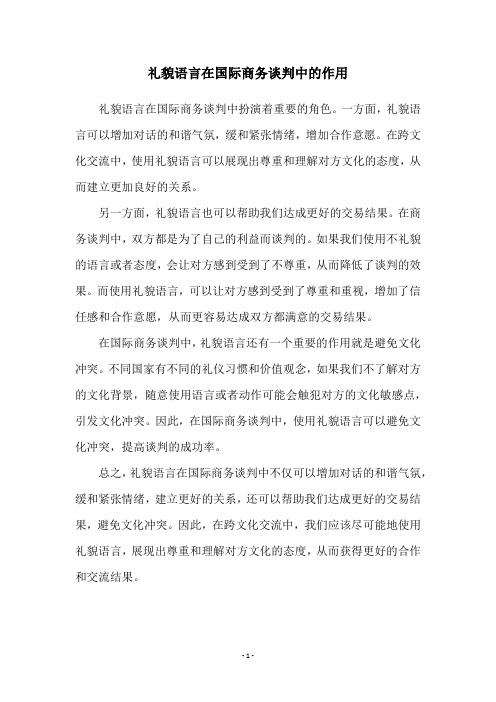
礼貌语言在国际商务谈判中的作用
礼貌语言在国际商务谈判中扮演着重要的角色。
一方面,礼貌语言可以增加对话的和谐气氛,缓和紧张情绪,增加合作意愿。
在跨文化交流中,使用礼貌语言可以展现出尊重和理解对方文化的态度,从而建立更加良好的关系。
另一方面,礼貌语言也可以帮助我们达成更好的交易结果。
在商务谈判中,双方都是为了自己的利益而谈判的。
如果我们使用不礼貌的语言或者态度,会让对方感到受到了不尊重,从而降低了谈判的效果。
而使用礼貌语言,可以让对方感到受到了尊重和重视,增加了信任感和合作意愿,从而更容易达成双方都满意的交易结果。
在国际商务谈判中,礼貌语言还有一个重要的作用就是避免文化冲突。
不同国家有不同的礼仪习惯和价值观念,如果我们不了解对方的文化背景,随意使用语言或者动作可能会触犯对方的文化敏感点,引发文化冲突。
因此,在国际商务谈判中,使用礼貌语言可以避免文化冲突,提高谈判的成功率。
总之,礼貌语言在国际商务谈判中不仅可以增加对话的和谐气氛,缓和紧张情绪,建立更好的关系,还可以帮助我们达成更好的交易结果,避免文化冲突。
因此,在跨文化交流中,我们应该尽可能地使用礼貌语言,展现出尊重和理解对方文化的态度,从而获得更好的合作和交流结果。
- 1 -。
国际商务英语谈判中的礼貌原则和策略研究

国际商务英语谈判中的礼貌原则和策略研究在国际商务谈判中,礼貌是至关重要的。
无论是在语言交流还是谈判策略上,都需要遵循一定的礼貌原则和策略。
在谈判中,礼貌不仅可以改善双方关系,还可以帮助双方更好地达成合作。
本文将从礼貌原则和策略两个方面来探讨国际商务英语谈判中的礼貌应对。
礼貌原则在国际商务英语谈判中,礼貌原则是几乎所有谈判人员都会遵循的基本准则。
礼貌原则包括尊重对方、保持友好、表达感谢等。
尊重对方是最基本的原则之一。
无论双方在谈判中是否存在分歧,都应该尊重对方的观点和立场,避免使用侮辱性的语言或行为。
保持友好也是非常重要的原则。
友好的态度可以缓和紧张的气氛,增强双方的互信,有利于达成双赢的结果。
表达感谢也是不可或缺的。
无论在谈判的哪个阶段,都应该适时地表达感谢,以显示出对对方的尊重和重视。
在国际商务英语谈判中,礼貌原则的遵循不仅可以改善双方的关系,还可以为谈判的顺利进行打下基础。
当双方都能遵循礼貌原则时,会更加容易找到共同点,更加愿意妥协,最终达成双赢的目标。
礼貌策略除了礼貌原则外,礼貌策略在国际商务英语谈判中也扮演着非常重要的角色。
礼貌策略包括使用礼貌用语、避免冲突性词语、委婉地提出建议等。
在谈判中,使用礼貌用语可以表达出对对方的尊重和礼貌,增进双方的友好关系。
礼貌用语包括问候语、感谢语、道歉语等,这些用语的使用可以使谈判气氛更加融洽、愉快。
避免冲突性词语也是非常重要的礼貌策略。
在谈判中,使用冲突性词语很容易引发对方的反感,从而恶化谈判气氛。
在谈判中应避免使用否定性、挑衅性的词语,而应选择委婉、含蓄的表达方式,以求得更好的谈判结果。
委婉地提出建议也是一种重要的礼貌策略。
在谈判中,直接而强硬地提出建议往往会引起对方的抵触情绪,导致谈判的不顺利。
应该选择委婉地、含蓄地提出建议,让对方感觉到自己的建议是出于善意的,有利于双方的合作。
国际商务英语谈判中的礼貌原则和策略研究
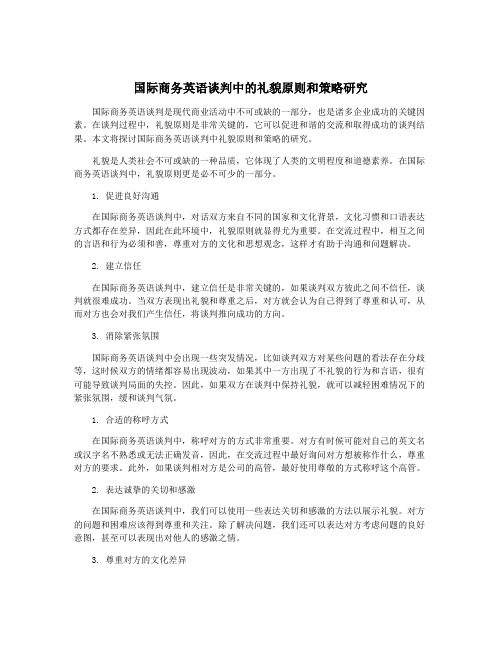
国际商务英语谈判中的礼貌原则和策略研究国际商务英语谈判是现代商业活动中不可或缺的一部分,也是诸多企业成功的关键因素。
在谈判过程中,礼貌原则是非常关键的,它可以促进和谐的交流和取得成功的谈判结果。
本文将探讨国际商务英语谈判中礼貌原则和策略的研究。
礼貌是人类社会不可或缺的一种品质,它体现了人类的文明程度和道德素养。
在国际商务英语谈判中,礼貌原则更是必不可少的一部分。
1. 促进良好沟通在国际商务英语谈判中,对话双方来自不同的国家和文化背景,文化习惯和口语表达方式都存在差异,因此在此环境中,礼貌原则就显得尤为重要。
在交流过程中,相互之间的言语和行为必须和善,尊重对方的文化和思想观念,这样才有助于沟通和问题解决。
2. 建立信任在国际商务英语谈判中,建立信任是非常关键的,如果谈判双方彼此之间不信任,谈判就很难成功。
当双方表现出礼貌和尊重之后,对方就会认为自己得到了尊重和认可,从而对方也会对我们产生信任,将谈判推向成功的方向。
3. 消除紧张氛围国际商务英语谈判中会出现一些突发情况,比如谈判双方对某些问题的看法存在分歧等,这时候双方的情绪都容易出现波动,如果其中一方出现了不礼貌的行为和言语,很有可能导致谈判局面的失控。
因此,如果双方在谈判中保持礼貌,就可以减轻困难情况下的紧张氛围,缓和谈判气氛。
1. 合适的称呼方式在国际商务英语谈判中,称呼对方的方式非常重要。
对方有时候可能对自己的英文名或汉字名不熟悉或无法正确发音,因此,在交流过程中最好询问对方想被称作什么,尊重对方的要求。
此外,如果谈判相对方是公司的高管,最好使用尊敬的方式称呼这个高管。
2. 表达诚挚的关切和感激在国际商务英语谈判中,我们可以使用一些表达关切和感激的方法以展示礼貌。
对方的问题和困难应该得到尊重和关注。
除了解决问题,我们还可以表达对方考虑问题的良好意图,甚至可以表现出对他人的感激之情。
3. 尊重对方的文化差异在国际商务英语谈判中,我们必须尊重对方的文化差异。
国际商务英语谈判中的礼貌原则和策略研究
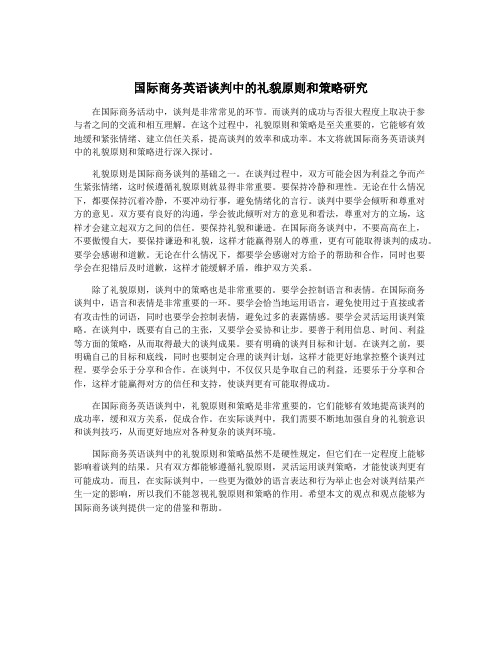
国际商务英语谈判中的礼貌原则和策略研究在国际商务活动中,谈判是非常常见的环节。
而谈判的成功与否很大程度上取决于参与者之间的交流和相互理解。
在这个过程中,礼貌原则和策略是至关重要的,它能够有效地缓和紧张情绪、建立信任关系,提高谈判的效率和成功率。
本文将就国际商务英语谈判中的礼貌原则和策略进行深入探讨。
礼貌原则是国际商务谈判的基础之一。
在谈判过程中,双方可能会因为利益之争而产生紧张情绪,这时候遵循礼貌原则就显得非常重要。
要保持冷静和理性。
无论在什么情况下,都要保持沉着冷静,不要冲动行事,避免情绪化的言行。
谈判中要学会倾听和尊重对方的意见。
双方要有良好的沟通,学会彼此倾听对方的意见和看法,尊重对方的立场,这样才会建立起双方之间的信任。
要保持礼貌和谦逊。
在国际商务谈判中,不要高高在上,不要傲慢自大,要保持谦逊和礼貌,这样才能赢得别人的尊重,更有可能取得谈判的成功。
要学会感谢和道歉。
无论在什么情况下,都要学会感谢对方给予的帮助和合作,同时也要学会在犯错后及时道歉,这样才能缓解矛盾,维护双方关系。
除了礼貌原则,谈判中的策略也是非常重要的。
要学会控制语言和表情。
在国际商务谈判中,语言和表情是非常重要的一环。
要学会恰当地运用语言,避免使用过于直接或者有攻击性的词语,同时也要学会控制表情,避免过多的表露情感。
要学会灵活运用谈判策略。
在谈判中,既要有自己的主张,又要学会妥协和让步。
要善于利用信息、时间、利益等方面的策略,从而取得最大的谈判成果。
要有明确的谈判目标和计划。
在谈判之前,要明确自己的目标和底线,同时也要制定合理的谈判计划,这样才能更好地掌控整个谈判过程。
要学会乐于分享和合作。
在谈判中,不仅仅只是争取自己的利益,还要乐于分享和合作,这样才能赢得对方的信任和支持,使谈判更有可能取得成功。
在国际商务英语谈判中,礼貌原则和策略是非常重要的,它们能够有效地提高谈判的成功率,缓和双方关系,促成合作。
在实际谈判中,我们需要不断地加强自身的礼貌意识和谈判技巧,从而更好地应对各种复杂的谈判环境。
- 1、下载文档前请自行甄别文档内容的完整性,平台不提供额外的编辑、内容补充、找答案等附加服务。
- 2、"仅部分预览"的文档,不可在线预览部分如存在完整性等问题,可反馈申请退款(可完整预览的文档不适用该条件!)。
- 3、如文档侵犯您的权益,请联系客服反馈,我们会尽快为您处理(人工客服工作时间:9:00-18:30)。
礼貌大同策略在国际商务谈判语言中的实现商务谈判是一个广为研究的课题,许多学者都从礼貌语言的角度研究商务谈判中的语言策略,其理论框架多是布朗和莱文森的面子理论或利奇的礼貌原则,然而这些理论在过去约二十年的研究中受到一些学者的质疑和批评。
基于此,利奇在回顾这些理论和批评的基础上提出了“礼貌大同策略”。
该理论在礼貌语用理论方面提出了新的见解。
本文采用礼貌大同策略为理论框架,从新的角度讨论商务英语谈判中的语言策略。
第一章为本文绪论部分。
该章为论文概述,涉及写作目的、语料来源、研究方法和论文的结构布局。
在相关语言学理论的指导下,本文采用的是定性分析的方法。
第二章为背景介绍。
对商务谈判的相关概念(包括定义、影响因素和谈判阶段)进行介绍。
第三章为文献回顾。
首先,对礼貌语用的理论发展作简单回顾。
其次,以商务谈判语言的礼貌语用策略方面所开展的各种研究之间的继承性和发展性为线索,回顾了各阶段的研究热点和相关结论。
第四章为该论文的主体部分。
按照礼貌大同策略的十点语用限制组织讨论内容,分析谈判人员在遵守这些语用限制、平衡谈判的交际目的和经济利益时采用的策略。
最后是论文的总结。
在回顾并总结文章的主要观点后,指出在商务谈判语言中礼貌大同策略的十点语用限制并未均衡地得到体现,且消极礼貌比积极礼貌获得更多的重视。
最后说明本研究对礼貌理论与实践做出的贡献、文章的局限性和不足之处,并指出进一步研究的方向。
